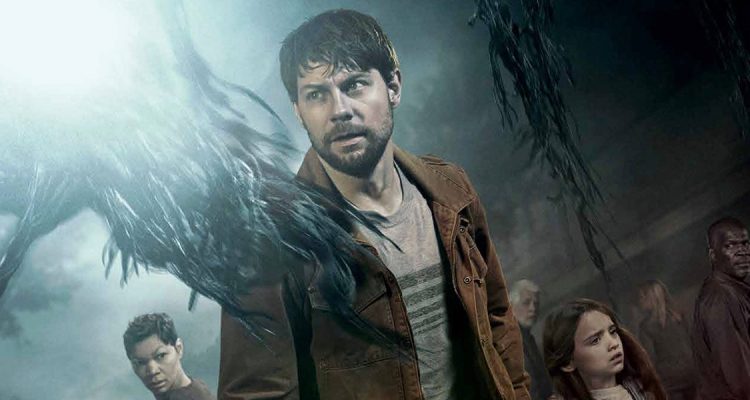How hard is it to then maintain that balance between servicing both the horror and dramatic elements of the show?
CB: It’s always drama first. I’ve worked on a lot of different shows across all genres and people will always ask me how I jump from a science fiction show set on a spaceship to a soap opera in a suburban neighborhood. My response would always be that writing is writing. If you take interest in characters with intriguing backstories and issues, played by wonderful actors, and then you put them in conflict with one another, it doesn’t really matter if it’s horror or science fiction or whatever. It’s easy to infuse the horrific elements into if there is a solid foundation of character drama.
Did the small town environment help maintain that tone?
PF: I definitely think so. We shot in South Carolina for most of it as though it were West Virginia and part of the mystique or romance of the horror is the fact that it takes place in such a small town. It gives you the feeling that it’s universal and it could happen in your home town. It could happen anywhere. The fact that it’s such a small town social structure means there’s not a lot of help so if the stain on the town itself is bleeding into or corrupting the actual infrastructure of the social part of the town, then it’s like you’re even more isolated since there aren’t many people to begin with.
Also the rural, sort of rustic nature of the locations and the way that we shot everything adds an eeriness to it that’s just based on the history of that part of America.
What is Kyle’s mindset like going into season two?
PF: At the beginning of season one we see Kyle as very downtrodden and the lowest he’s ever been. Through the first season we seem him stop being subject to his circumstances and instead start trying to dictate what’s going to happen in his life and take control of his fate. Following everything that happened in the season one finale, the beginning of season two shows all of these characters, including Kyle, having to deal with the consequences of what happened. I think part of it is Kyle finding a purpose and at the end of season one he realizes that he can’t just run and he’ll have to find and fight for his purpose which is the impression he has at the start of season two.
What I really dig about the second season is that you start thinking Kyle is going to be a demon fighting, superhero-like character who is going to get everything together and the characters and plot elements are introduced that really spin his world perspective again. All of that brings very emotionally connected elements into his life that he has to figure out how to navigate.
What are some of the challenges of this role that you may not have encountered in the past?
PF: I really like playing characters who have a duality to them. I like that Kyle was, when we first met him, very dark and almost could have been the villain as he is exiled in this town. Then as we get to know him we start to, hopefully, root for him because realize that his spirit is a noble one. His motivations play true to what we think of as good. Playing a character that has some history that they’re not comfortable with.
I also kept telling Chris and Robert all the time that I love that they wrote a quiet cowboy since he has a southern accent and he mumbles. When he says anything it’s always very expressive so the very little he says has a lot of subtext to it and his facial expressions are very telling of who is and that’s really great character to play. I’d always joked that I wanted to play the quiet cowboy and I never got the chance to until they nailed it and gave me the shot.
CB: I look at the show now and I’d worked with Patrick before and thought he’d be perfect for this. I look back at two seasons of the show now and can’t imagine anyone else playing this role.
What was the biggest difference between shooting season one and season two of the show?
PF: I think we learned a great deal in terms of logistics and resource management from season one. We had a really good team and all of our departments were crushing it and we were able to start season two off on very stable ground. We were splitting up units and covering a lot of material each episode with less effort, which is always great.
CB: I agree. It was twofold, I think. It was exactly what Patrick was saying because everyone gets more into the rhythm and you maximize your resources better. The same is true of the creative side. Everyone is now familiar with the characters.
Most excited for fans to take away from season two?
PF: I’m most excited is also some of what I found the most fun to play which is the history of Rome and Kyle’s part of the legacy there.
CB: I think you see all of these characters roles expand and see them stepping up in ways. Characters who were previously supporting becomes hugely important in season two, assuming greater roles in the show. Everything is just being taken up a notch which I found really fun to be realized on screen.
“Outcast” season 2 is currently airing on Cinemax.

